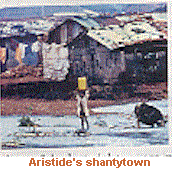
| Want to send this page or a link to a friend? Click on mail at the top of this window. |
| First published in the Sunday Boston Herald, May 15, 1994 |
| Aristide is not the answer to Haiti's systemic problem |
| _________ |
| By YVES A. ISIDOR |
Cambridge, Massachusetts - Since it gained its independence from France in 1804, Haiti's lot has been functional anarchy.
Ironically, while most Haitians' quality of life continues to decline, and the very few who control the means of production are becoming richer, little more than a week ago, the United Nations voted to tighten economic sanctions on Haiti, effective May 21, in an effort to restore democracy.
What an aberration? According to the World Development 1993 Report, distributed by the World Bank, gross domestic investments have plummeted to 8 percent from 14.8 percent.
The country has public and private debts of $874 million that it is unable to service, and its estimated 85 percent illiteracy rate will be an obstacle to economic development for decades.
 |
|
|
|
Some 22 of Haiti's 30 watersheds have as well been deforested. The remaining ones are disappearing.
According to the U.S. Agency for International Development 1993 Report, 145 out of every 1,000 Haitian children die before reaching 1 year of age, from dehydration and diarrhea, which along with gastroenteritis account for 90 percent of child deaths.
In the past two years, 55,000 Haitians have lost their jobs.
When I consider these pressing problems and others, it has become quite apparent that had it not been for the continuing economic assistance of Haitians living overseas - around $145 million yearly - today my fellow Haitian compatriots back home would have been in worse shape.
It is a waste of time for the Clinton administration to continue to support Jean-Bertrand Aristide, who has repeatedly called the White House a "devil place."
To my knowledge, he has no plan to address the anticipated problems that the expanded U.N. sanctions will cause the destitute Haitians to experience.
To further emphasize why a leftist like Aristide is far from been qualified to run Haiti, let's look at a few more issues.
From day one, partisan politics was the backbone of his eight months in government. First he named an amateur prime minister, then Cabinet ministers. He named a medical doctor to the position of foreign affairs.
Thanks be God, Aristide did not return on October 30, 1993, as provided in the July 3, 1993, Governors Island Accord.
His management record and his view of capitalism as a "mortal sin" should be evidence enough to make the international community wary of providing his government with the type of financial assistance the nation needs - including the $1 billion in U.S. aid that was promised.
That would be a continuation of what I called in my economics course on the growth of emerging countries' "absentee government," a way of describing a government that does not improve the overall social economic conditions of citizens by at least 1.1 percent while in office.
If we Haitians would only form a "public consensus" in our divided and impoverished nation, presiding over what can be best described as a "nonparty system" made up of shifting groups of democrats, nationalists, and Old Guard Duvalierists.
In turn, this will pave the way for a democratic society that could finally put the never-healthy Haitian economy on a stable foundation.
Yves A. Isidor teaches economics at Massachusetts Bay Community College.
| Wehaitians.com, the scholarly journal of democracy and human rights |
| More from Wehaitians.com |